Cousteau's Ocean Futures Society depends on Lectrosonics wireless
The professional video industry's #1 source for news, trends and product and tech information. Sign up below.
You are now subscribed
Your newsletter sign-up was successful
Over 18 months of work with Jean-Michel Cousteau’s Ocean Futures Society, sound engineer Gary Holland has encountered everything from TV-saturated cities to marine band-intensive shipping lanes. Throughout his travels, Holland has relied on Lectrosonics URC411A digital hybrid wireless systems to cut through the RF clutter and deliver pristine audio of scientists discussing critical environmental issues.
The Ocean Futures Society is dedicated to educating people on the critical role of the oceans in the Earth’s well being, and Holland uses Lectrosonics wireless to document interviews and events in an unpredictable array of locations from the Baja peninsula to the Arctic Sea. Using the receiver’s LCD screen and on-board spectrum analyzer, Holland easily identifies open frequencies, opens those channels and listens for problems. Once that is complete, his task turns to optimizing audio in the face of typical location issues, such as setting rolloffs to minimize the effects of mechanical noise sources. The goal is the clean and discreet capture of interviews with leading scientists.
The Lectrosonics URC411A has made it possible to close-mic participants every time, ensuring intelligible audio. When the situation allows (or demands) open mic techniques, Holland still relies on his Lectrosonics, confident that the hybrid system’s processing will preserve the dynamic range and frequency response needed to preserve and convey realistic, natural ambience. Prior to this expedition, Holland worked extensively with Jacques Yves Cousteau and on other marine wildlife film projects.
For more information, please visit www.lectrosonics.com.
The professional video industry's #1 source for news, trends and product and tech information. Sign up below.
